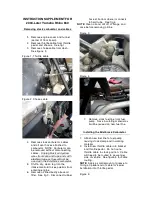
Driving style — good driving and fuel economy habits
Give consideration to the lists that follow and you may be able to change
a number of variables and improve your fuel economy.
Habits
•
Smooth, moderate operation can yield up to 10% savings in fuel.
•
Steady speeds without stopping will usually give the best fuel
economy.
•
Idling for long periods of time (greater than one minute) may waste
fuel.
•
Anticipate stopping; slowing down may eliminate the need to stop.
•
Sudden or hard accelerations may reduce fuel economy.
•
Slow down gradually.
•
Drive at reasonable speeds (traveling at 105 km /h [65 mph] uses 15%
more fuel than traveling at 88 km/h [55 mph]).
•
Revving the engine before turning it off may reduce fuel economy.
•
Use of the air conditioner or defroster may reduce fuel economy.
•
Use of speed control (if equipped) may improve fuel economy. Speed
control can help maintain a constant speed and reduce speed changes.
You may want to turn off the speed control in hilly terrain as
unnecessary shifting between third and fourth gears may occur and
could result in reduced fuel economy.
•
Warming up a vehicle on cold mornings is not required and may
reduce fuel economy.
•
Resting your foot on the brake pedal while driving may reduce fuel
economy.
•
Combine errands and minimize stop-and-go driving.
Maintenance
•
Keep tires properly inflated and use only recommended size.
•
Operating a vehicle with the wheels out of alignment will reduce fuel
economy.
•
Use recommended engine oil. Refer to
Lubricant Specifications
.
•
Perform all regularly scheduled maintenance items. Follow the
recommended maintenance schedule and owner maintenance checks
found in your vehicle maintenance guide and or service guide.
Maintenance and care
185
Содержание 1999 Ranger
Страница 206: ...2 5 3 1 4 Capacities and specifications 206...
Страница 213: ...213...
Страница 214: ...214...
















































